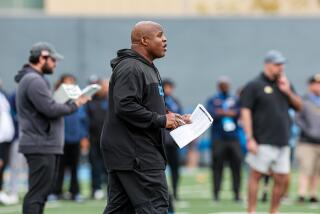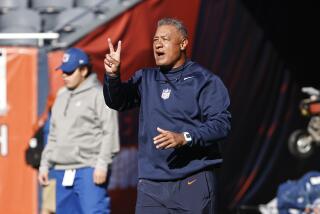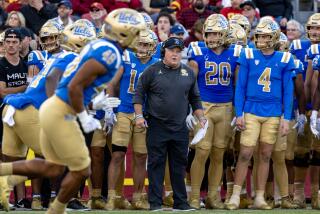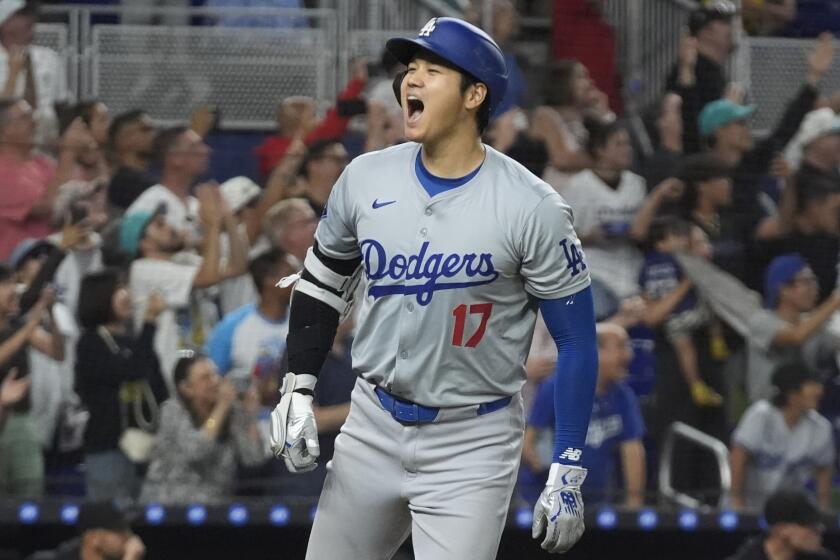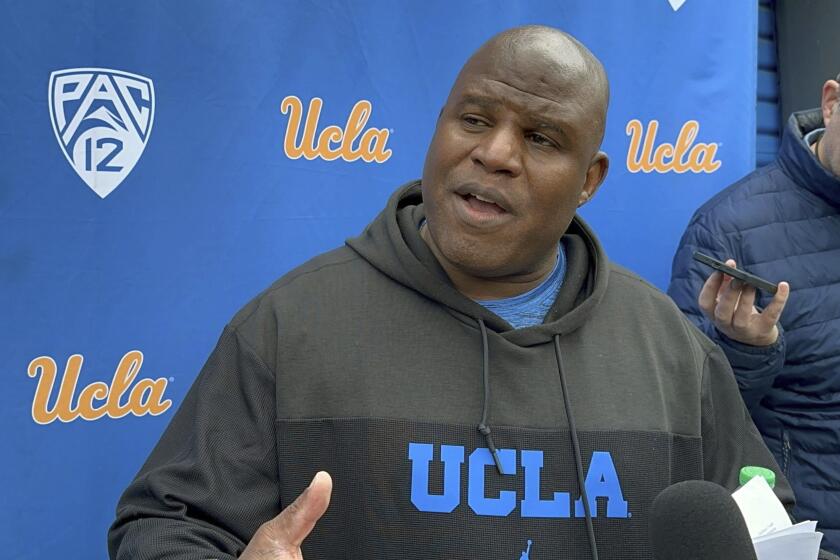Giving up play-calling reins hard for some coaches
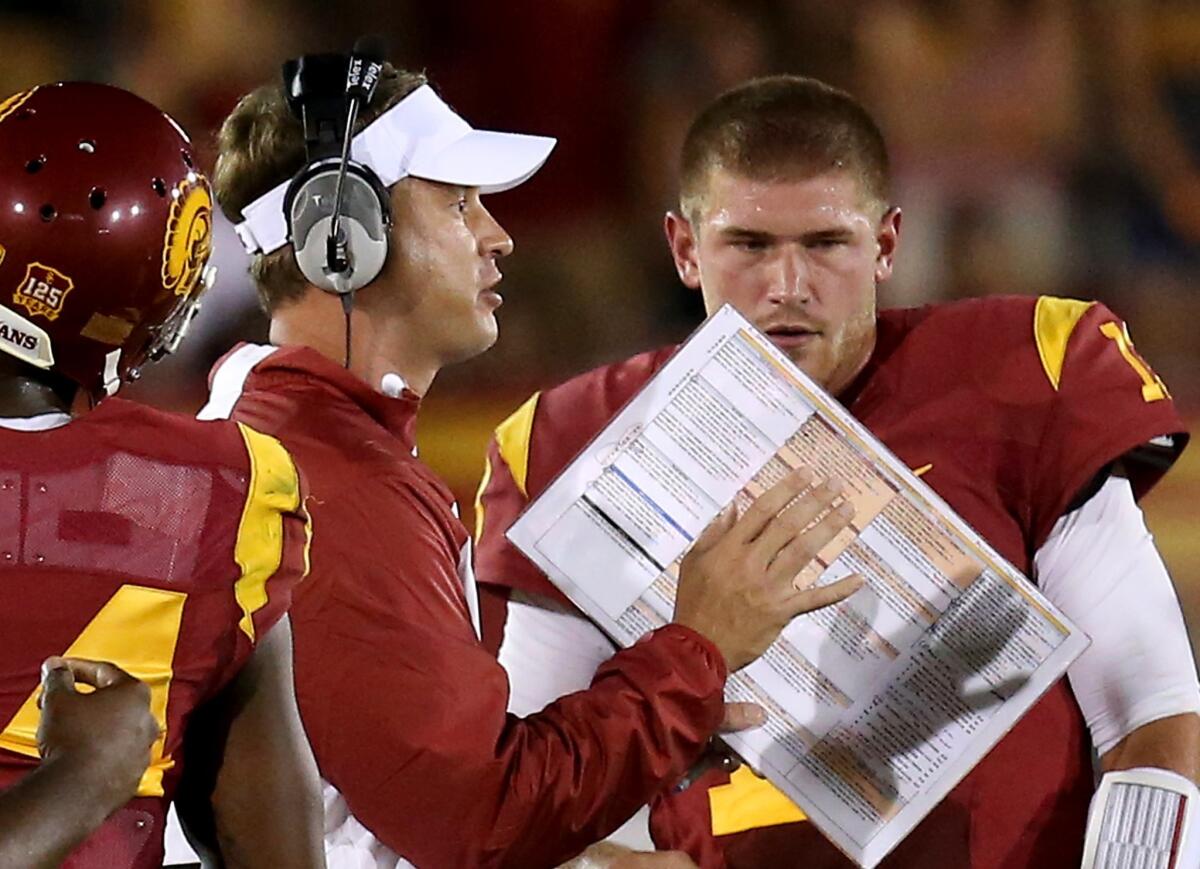
Hiring a staff and schmoozing with boosters was not the toughest thing Mike Bellotti had to do after he was hired as head coach at Oregon in 1995.
The toughest part was replacing the offensive coordinator, Mike Bellotti.
It meant giving up the thing he loved most about his job.
Bellotti had called plays from his days at Cal State Hayward in the early 1980s through his tenure as Oregon’s coordinator under Rich Brooks.
“It was hard,” Bellotti said this week. “It’s the most fun. It’s a rush when you call a play that works. You don’t want to give that up.”
Bellotti did give it up because he believed the Ducks would be better served if he acted as coach of the whole team. He didn’t want to be so consumed with the laminated play sheet that he became disconnected from managing the game.
For example, he remembers that, when he was head coach at Chico State in the mid-’80s, he once forgot to call off a punt block because he was talking with his quarterback.
So when Bellotti got the Oregon job, he subjugated his ego and hired, over 14 seasons, the brightest offensive minds he could find. The group of coordinators included Jeff Tedford, Dirk Koetter, Al Borges, Gary Crowton, Andy Ludwig and Chip Kelly.
Bellotti led the Ducks to their first four 10-win seasons and to the brink of a national title in 2001, when they finished No. 2. He took the baton from Brooks and set the program on course to its present-day, Nike-fueled, uniformed-crazed greatness.
“I trusted the guys I hired,” Bellotti said.
Kelly continued to call plays after he was promoted from offensive coordinator to replace Bellotti in 2009, and he nearly led Oregon to the Bowl Championship Series title the next season. But after Kelly left to take over the NFL’s Philadelphia Eagles, Mark Helfrich took over at Oregon and deferred the calls to assistant coach Scott Frost.
Bellotti says it is obviously possible to handle both duties, but he says coaches who do “give things up.”
Many USC fans who watch Lane Kiffin with his nose glued to what looks like a Denny’s menu hoped the Trojans coach would delegate some duties. Some thought handing in his own playbook would be part of Kiffin’s major off-season overhaul in the wake of last year’s 7-6 finish.
Kiffin, though, decided to keep calling plays. He loves it too much, and he’s not alone.
A survey of this week’s Associated Press poll showed that five of the nation’s top 25 teams have coaches who call their own offensive plays: Jimbo Fisher for No. 8 Florida State, Steve Spurrier for No. 12 South Carolina, Steve Sarkisian for No. 17 Washington, Hugh Freeze for No. 21 Mississippi and Kliff Kingsbury for No. 25 Texas Tech.
Kingsbury, 34, has not yet finished his first month as a first-year head coach after coming over from Texas A&M.; He said the early transition to head coach/play caller has been smooth.
“I have a defensive coordinator I completely trust,” he said. “I would say I’m more in tune to what’s going on. Instead of going over to my quarterback while my defense is out there I’m paying attention to that now, but not much else has changed.”
Some top coaches don’t call offensive plays because their expertise is defense. That group includes Alabama’s Nick Saban, Florida’s Will Muschamp, Northwestern’s Pat Fitzgerald, Arizona State’s Todd Graham, Oklahoma’s Bob Stoops and Louisville’s Charlie Strong.
Stanford’s David Shaw and his staff have a nebulous play-calling-by-committee approach.
Barry Switzer, who won three national titles at Oklahoma, said there’s a good reason head coaches should not call the offensive plays.
“You’ve got the worst seat in the house,” Switzer said. “I would never call plays from the sideline. No way I could. You don’t know where the ball is. You need someone upstairs to tell you it’s third and two.”
Switzer had a simple game plan when his teams ran the wishbone. “If it was second-and-five and my offensive coordinator called pass I’d have fired him,” he said.
For others, it can be hard to kick the play-calling habit.
Tedford tried to give it up when he was head coach at California but kept having relapses. Even South Carolina’s Spurrier, maybe the best play-caller of his generation, decided a few years ago he needed to quit. Spurrier thought he was spreading himself too thin. He delegated play calling to his son, Steve Spurrier Jr., but that didn’t last long and “The Old Ball Coach” is back calling all shots again for the Gamecocks.
Baylor Coach Art Briles is one of the brilliant offensive minds in coaching. His Bears have scored 19 touchdowns in two games this season and lead the nation with a 69.5 points-per-game average. Yet even Briles has turned over most of the play calling to coordinator Philip Montgomery.
“I’ve really backed off here the last year or two,” Briles said. “I think it’s really helped me and it’s helped us as a football team. It’s allowed me to do more things.”
There are basically two camps: coaches who prefer the role as CEO and those Bellotti calls “the actively involved coordinator-head coach.”
Coaches such as Kiffin, Washington State’s Mike Leach, Arizona’s Rich Rodriguez and Washington’s Sarkisian — all from the Pac-12 Conference — fall into the “actively involved” category. Leach said he might stop if he ever got tired of it, but added, “There is no end in sight.”
Taking the play sheet from these guys is tantamount to yanking a lollipop from a kid’s mouth.
“Half the reason I coach is because I call plays,” Sarkisian said. “I got hired for a variety of reasons. One reason was my play calling. I’m not saying that in an arrogant way. Play calling is one of my strengths.”
Sarkisian didn’t seem to be paying enough attention to the other side two years ago when Washington’s defense ranked among the nation’s worst. The situation is much improved now with coordinator Justin Wilcox and the Huskies are ranked in the top 20 of both major polls.
Coaches who call plays can reach the highest levels. Spurrier won a national title at Florida in 1996 and Kelly almost won at Oregon in 2010. When Rodriguez was coach at West Virginia in 2007, he needed only to beat a lousy Pittsburgh team to advance to the BCS title game — but didn’t.
Only one BCS-era champion’s head coach has called the plays on his way to a title: Ohio State’s Jim Tressel in 2002.
It might be coincidence that head coaches who call their own plays have not won very many titles.
Or, as Bellotti suggests, it might just be harder.
More to Read
Go beyond the scoreboard
Get the latest on L.A.'s teams in the daily Sports Report newsletter.
You may occasionally receive promotional content from the Los Angeles Times.
